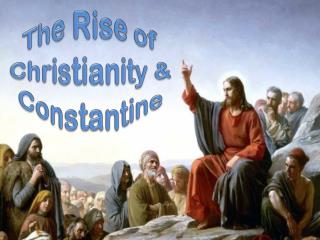

It was Providence that meant it was the destiny of the Anglo-Saxons to become Christians, united in a single Christian nation. For Bede, a Christian England was part of God's master plan. Certainly the Venerable Bede wanted to see it this way. It could be argued that it was Augustine's famous mission in 597 AD from the Pope in Rome to King Aethelbert of Kent that really set up the future course of Christianity in Britain, creating a strong alliance between Christianity and Kingship. Missionary activity continued in Wales and Ireland, and in Western Scotland Saint Columba helped to bring a distinctly Irish brand of Christianity to mainland Britain. Yet somehow Christianity survived on the Western edges of Britain, even during the Dark Ages. It looked as if Paganism might again get the better of Christianity when, after the departure of the Romans, new invaders arrived: Angles, Saxons and Jutes.

Pagan beliefs still abounded and Christianity was a minority faith. From 313 AD onwards, Christian worship was tolerated within the Roman Empire.ĭuring the 4th Century, British Christianity became more visible but it had not yet won over the hearts and minds of the population. He saw that Christianity could be harnessed to unite his Empire and achieve military success.

Christians were forced to meet and worship in secret.īut a single religion with a single God appealed to the Roman Emperor Constantine. It was this intolerance of other gods, and its secrecy, which rattled the Roman authorities and led to repeated persecutions of Christians. It began when Roman artisans and traders arriving in Britain spread the story of Jesus along with stories of their Pagan deities.Ĭhristianity was just one cult amongst many, but unlike the cults of Rome, Christianity demanded exclusive allegiance from its followers. But in fact Christianity arrived long before then, and in the 1st Century AD, there wasn't an organised attempt to convert the British. We tend to associate the arrival of Christianity in Britain with the mission of Augustine in 597 AD. Into this superstitious and violent world came a modern, fashionable cult from the east: Christianity. In the 1st Century AD, Britain had its own set of religious icons: Pagan gods of the earth and Roman gods of the sky. This article charts the course of Christianity in Britain from its first tentative steps to the final settlement of a Protestant faith. The rise of Christianity from a persecuted sect to a global religion is a remarkable story of guts, faith, chance, politics and Providence.


 0 kommentar(er)
0 kommentar(er)
